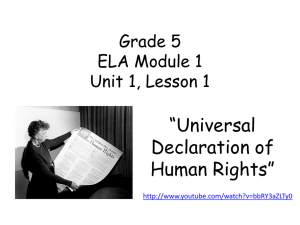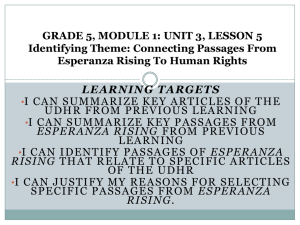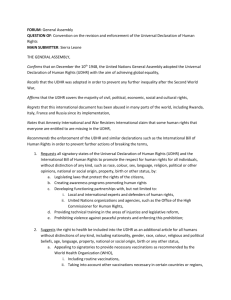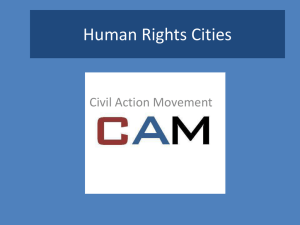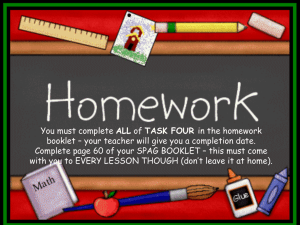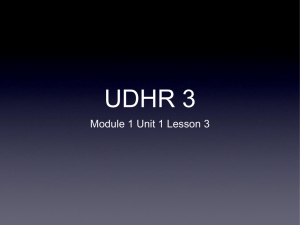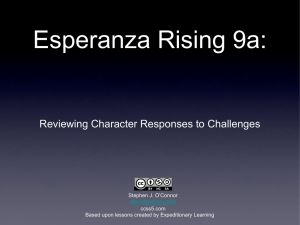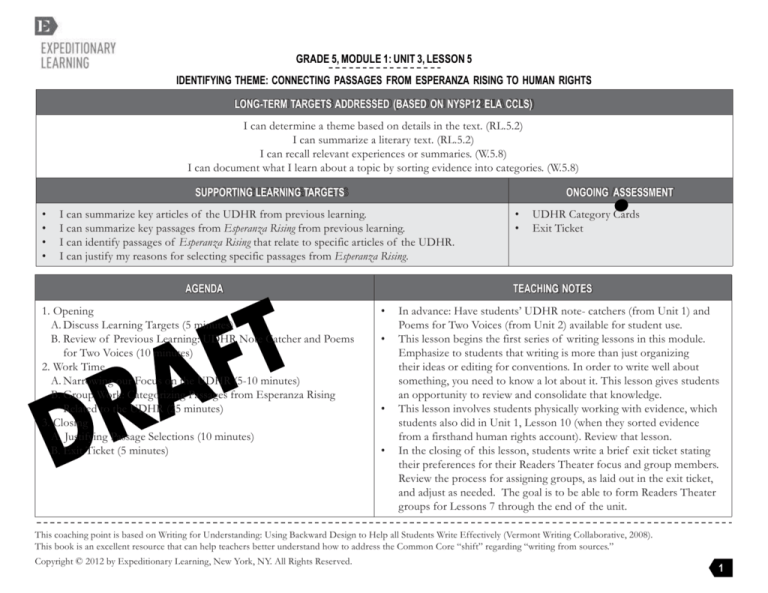
GRADE 5, MODULE 1: UNIT 3, LESSON 5
IDENTIFYING THEME: CONNECTING PASSAGES FROM ESPERANZA RISING TO HUMAN RIGHTS
LONG-TERM TARGETS ADDRESSED (BASED ON NYSP12 ELA CCLS)
I can determine a theme based on details in the text. (RL.5.2)
I can summarize a literary text. (RL.5.2)
I can recall relevant experiences or summaries. (W.5.8)
I can document what I learn about a topic by sorting evidence into categories. (W.5.8)
SUPPORTING LEARNING TARGETS
•
•
•
•
ONGOING ASSESSMENT
I can summarize key articles of the UDHR from previous learning.
I can summarize key passages from Esperanza Rising from previous learning.
I can identify passages of Esperanza Rising that relate to specific articles of the UDHR.
I can justify my reasons for selecting specific passages from Esperanza Rising.
AGENDA
1. Opening
A. Discuss Learning Targets (5 minutes)
B. Review of Previous Learning: UDHR Note Catcher and Poems
for Two Voices (10 minutes)
2. Work Time
A. Narrowing our Focus on the UDHR (5-10 minutes)
B. Group Work: Categorizing Passages from Esperanza Rising
Related to the UDHR (25 minutes)
3. Closing
A. Justifying Passage Selections (10 minutes)
B. Exit Ticket (5 minutes)
•
•
UDHR Category Cards
Exit Ticket
TEACHING NOTES
•
•
•
•
In advance: Have students’ UDHR note- catchers (from Unit 1) and
Poems for Two Voices (from Unit 2) available for student use.
This lesson begins the first series of writing lessons in this module.
Emphasize to students that writing is more than just organizing
their ideas or editing for conventions. In order to write well about
something, you need to know a lot about it. This lesson gives students
an opportunity to review and consolidate that knowledge.
This lesson involves students physically working with evidence, which
students also did in Unit 1, Lesson 10 (when they sorted evidence
from a firsthand human rights account). Review that lesson.
In the closing of this lesson, students write a brief exit ticket stating
their preferences for their Readers Theater focus and group members.
Review the process for assigning groups, as laid out in the exit ticket,
and adjust as needed. The goal is to be able to form Readers Theater
groups for Lessons 7 through the end of the unit.
This coaching point is based on Writing for Understanding: Using Backward Design to Help all Students Write Effectively (Vermont Writing Collaborative, 2008).
This book is an excellent resource that can help teachers better understand how to address the Common Core “shift” regarding “writing from sources.”
Copyright © 2012 by Expeditionary Learning, New York, NY. All Rights Reserved.
1
GRADE 5, MODULE 1: UNIT 3, LESSON 5
IDENTIFYING THEME: CONNECTING PASSAGES FROM ESPERANZA RISING TO HUMAN RIGHTS
LESSON VOCABULARY
MATERIALS
review, summarize, focus, identify, categorize, justify,
narrow, select/selections, relate, passage (selections)
•
•
•
•
•
•
•
•
UDHR note-catcher (from Unit 1)
Poems for Two Voices (from Unit 2)
UDHR category cards
Evidence strips from Esperanza Rising
Scissors
Glue sticks (one per pair of students)
Index cards
Anchor chart: Human Rights Challenges in Esperanza Rising (from Unit 2)
MEETING STUDENTS’ NEEDS
OPENING
A. Discuss Learning Targets (5 minutes)
• Review the Learning Targets with students, focusing on the terms recall (to remember from previous
learning) and categorize (meaning to sort or classify). Use this opportunity to point out the prefix re-,
which means again.
Copyright © 2012 by Expeditionary Learning, New York, NY. All Rights Reserved.
•
Increase interactions with
vocabulary in context. This
increases rate of vocabulary
acquisition for ELLs.
2
GRADE 5, MODULE 1: UNIT 3, LESSON 5
IDENTIFYING THEME: CONNECTING PASSAGES FROM ESPERANZA RISING TO HUMAN RIGHTS
OPENING
B. Review of Previous Learning: UDHR Note Catcher and Poems for Two Voices (10 minutes)
• Return the UDHR note-catchers students (created in Unit 1) and their Poems for Two Voices (completed in
Unit 2). Display the anchor chart Human Rights Challenges in Esperanza Rising, from Unit 2.
• Tell students that today is the exciting day when they really get to begin planning their own Readers Theater
script. To help them think about this, they will need to look over the notes from all they have been learning in
this module.
• Say, “Let’s look at our summaries of the UDHR articles, from Unit 1, as well as our Poems for Two Voices and
our anchor chart Human Rights Challenges in Esperanza Rising, from Unit 2. Which UDHR articles were you
able to connect to the human rights challenges faced by the characters in Esperanza Rising when you created these
poems?”
• Allow students a moment to consider, then pair share their thinking. Allow several students to share their ideas
with the class, prompting them to cite specific language from the UDHR, Esperanza Rising, and/or their
Poems for Two Voices.
• Tell students that today they are going to narrow their focus to Article 5 of the UDHR, in order to start
identifying and categorizing passages for the creation of their own Readers Theater scripts, based on the novel
Esperanza Rising.
MEETING STUDENTS’ NEEDS
•
When possible, provide
text or materials found
in students’ L1. This
can help students
understand materials
presented in English.
Note: If any students are missing either the graphic organizer or the Poem for Two Voices, they may look on with another student.
Copyright © 2012 by Expeditionary Learning, New York, NY. All Rights Reserved.
3
GRADE 5, MODULE 1: UNIT 3, LESSON 5
IDENTIFYING THEME: CONNECTING PASSAGES FROM ESPERANZA RISING TO HUMAN RIGHTS
MEETING STUDENTS’ NEEDS
WORK TIME
A. Narrowing our Focus on the UDHR (5-10 minutes)
• Have students get into groups of three to five. Say: “We have been studying 11 UDHR articles, but now
we are going to narrow our focus to 5 of those articles. On your UDHR note-catchers, place a star next
to UDHR Articles 2, 14, 16, 17 and 25.” Give the class a minute to mark these articles, then ask several
students to share the summaries they have already written for each of the five articles.
• Next, distribute the UDHR category cards and scissors to each student. Have students write their name
at the top of each card, then cut apart along the lines, so each student will have 5 cards all together.
•
ELL language acquisition is
facilitated by interacting with
native speakers of English
who provide models of
language.
B. Group Work: Categorizing Passages from Esperanza Rising related to the UDHR (25 minutes)
• Give each student a copy of the page Evidence Strips from Esperanza Rising. Display a copy of the
evidence strips as well as a copy of the UDHR category cards.
• Tell students that they are going to do something similar to an activity they did in Unit 1, when they looked
at specific evidence from a firsthand human rights account and connected it to articles in the UDHR.
Invite students to quickly turn and talk about what they remember about that activity.
• Say to students: “I am going to start by reading the first passage from Esperanza Rising, then I am going to
review my UDHR category cards, and think about which of the five UDHR categories I think this passage
belongs in. I would like you to think about the category the passage belongs in as well.” Allow a moment
of think time, then cold call several students to share their ideas. Make sure to have students justify why
they think the passage belongs in a category. Share your own thinking as well.
• Model as needed with one or two more passages, so students understand that they will be placing
individual passages into categories of the UDHR.
• Instruct students to read through all remaining passages silently once. Then ask students to cut the
passages into individual strips.
• Invite students to discuss with their group which passages belong in which categories and why (i.e., justify).
* “Which passages relate to which articles of the UDHR?”
* “What is your evidence?”
• Move throughout the room to offer support as needed.
• Distribute glue sticks, and ask the class members to physically glue each passage onto the UDHR category
card that best connects to the passage, based on their group discussion. Remind students that in the next
step, they will need to be able to justify why they placed a certain passage into a specific category.
•
Provide anchor charts for
processes such as “How to
Categorize Passages from
Esperanza Rising” This would
include question words with
nonlinguistic representations
and a question frame.
Note: Students will not fill in the sentence frames at the bottom of each category card until Closing, Step A.
Copyright © 2012 by Expeditionary Learning, New York, NY. All Rights Reserved.
4
GRADE 5, MODULE 1: UNIT 3, LESSON 5
IDENTIFYING THEME: CONNECTING PASSAGES FROM ESPERANZA RISING TO HUMAN RIGHTS
MEETING STUDENTS’ NEEDS
CLOSING AND ASSESSMENT
A. Justifying Passage Selections (10 minutes)
• Pose the following question to the class: “Were any of the passages difficult to categorize? If so, why?”
Allow several students to respond.
• Tell students that now that they have had a chance to think and talk, they are more ready to write.
• Ask them to fill in the sentence frames at the bottom of each of their UDHR category cards, in order to
justify (give a reason) why they placed passages into certain categories. Give students several minutes to
complete this. If time allows, cold call several students to share their justifications.
•
Consider allowing students to
draw their observations, ideas,
or notes when appropriate.
This allows all students to
participate in a meaningful
way.
B. Exit Ticket (5 minutes)
• Give each student an index card. Ask each student to write the following information on the card:
* Name
* Rank order (first, second, and third choice) of UDHR Articles 2, 14, 16, 17, and 25 that they are most
interested in focusing on for their Readers Theater script.
* The names of at least 5 other students she/he would like to work with on writing the Readers Theater
script and why.
• Collect the UDHR category cards and exit tickets.
•
Consider allowing students
that struggle with written
language to dictate their
Exit Ticket to a partner or a
teacher.
MEETING STUDENTS’ NEEDS
HOMEWORK
•
Tell someone at home about the UDHR themes you are interested in writing a Readers Theater script
about, and why that theme interests you.
Note: Either predetermine groups for students or use student exit tickets from this lesson to create groups for the next lesson,
Launching Readers Theater Groups.
Copyright © 2012 by Expeditionary Learning, New York, NY. All Rights Reserved.
•
For students needing additional
supports producing language,
consider offering a sentence
frame, sentence starter, or a
cloze sentence to assist with
language production and
provide the structure required.
5
GRADE 5, MODULE 1: UNIT 3, LESSON 5
UDHR Category Cards
Instructions to Teacher: Cut these cards apart, so you have 5 separate Category Cards.
UDHR Article 2, “Everyone has the same rights and freedoms, regardless of color, sex, language, religion, politics, or nation of birth.”
These passages belong in this category because
UDHR Article 14, “Everyone has the right to seek protection and freedom in another country, and escape from persecution.”
These passages belong in this category because
Copyright © 2012 by Expeditionary Learning, New York, NY. All Rights Reserved.
6
GRADE 5, MODULE 1: UNIT 3, LESSON 5
UDHR Category Cards
UDHR Article 16, “Regardless of race, nationality or religion, everyone has the right to marry the person of their choice.”
These passages belong in this category because
UDHR Article 17, “Everyone has the right to own property, alone or with others of their choice.”
These passages belong in this category because
Copyright © 2012 by Expeditionary Learning, New York, NY. All Rights Reserved.
7
GRADE 5, MODULE 1: UNIT 3, LESSON 5
UDHR Category Cards
UDHR Article 25, “Everyone has the right to adequate food, clothing, housing and medical care, regardless of circumstances beyond his/her control.”
These passages belong in this category because
Copyright © 2012 by Expeditionary Learning, New York, NY. All Rights Reserved.
8
GRADE 5, MODULE 1: UNIT 3, LESSON 5
Evidence Strips from Esperanza Rising
Instructions: Read all these passages once for gist and then a second time to annotate.
Then cut them into evidence strips to discuss with your group.
(p. 31) “I predicted you would say no, Ramona,” said Tío Luis. “And I have a solution to your living arrangements.
A proposal actually. One of marriage.”
(p. 32) “You will regret your decision, Ramona. You must keep in mind that this house and those grapes are on my property. I can
make things difficult for you. Very difficult. I will let you sleep on the decision, for it is more than generous.”
(p. 33) “It is your influence he wants. People in this territory loved Sixto and respect you.
With you as his wife, Luis could win any election.”
(p. 33) “Please officially relay this message to Luis. I will never, ever, change my mind.” “I will do that, Ramona,” said the lawyer.
“But be careful. He is a devious, dangerous man.”
(pp. 119-120) “It is frustrating. I can fix any engine. But they will only hire Mexicans to lay track and dig ditches, not as mechanics.
I’ve decided to work in the fields until I can convince someone to give me a chance.”
(p. 132) “This is what we are!” she yelled. “Small, meek animals. And that is how they treat us because we don’t speak up. If we ask
for what is rightfully ours, we will never get it! Is this how we want to live?”
Copyright © 2012 by Expeditionary Learning, New York, NY. All Rights Reserved.
9
GRADE 5, MODULE 1: UNIT 3, LESSON 5
Evidence Strips from Esperanza Rising
(p. 132) “Senor, does it not bother you that some of your compadres live better than others?” yelled one of Marta’s friends. “We are
going to strike in tow weeks. At the peak of cotton. For higher wages and better housing!”
(p. 134) “They work wherever there is something to be harvested. Those camps, the migrant camps, are the worst.”
(p. 134) “Our camp is a company camp and people who work here don’t leave. Some live here for many years. That is why we came to
this country. To work. To take care of our families. To become citizens.”
(p. 170) “Repatriation,” said Marta’s aunt. “La Migra—the immigration authorities—round up people who cause problems and check
their papers.”
(p. 171) Esperanza remembered the train at the border and the people being herded on to it.
(p. 171) Marta’s aunt also said, “There is also some talk about harming Mexicans who continue to work.”
(p. 186) “Some of the other market owners aren’t as kind to Mexicans as Mr. Yakota,” said Miguel. “He stocks many of the things we
need and he treats us like people.”
Copyright © 2012 by Expeditionary Learning, New York, NY. All Rights Reserved.
10
GRADE 5, MODULE 1: UNIT 3, LESSON 5
Evidence Strips from Esperanza Rising
(p. 193) There were only ten wooden toilet stalls for hundreds of people and Esperanza could smell the effects from the truck. Some
people lived in tents but others had only burlap bags stretched between poles. Some were living in their cars or old trucks. Mattresses
were on the ground, where people and dogs rested.
(p. 194) “Do you have food so that I can feed my family?” said the father.
“We were thrown out of our camp because I was striking. My family has not eaten in two days.”
(p. 204) “Where will it end?” said Josefina. “Everyone will starve if the people work for less and less money.”
If you finish early, you may want to explore pages 204–212 and 214–224 for additional passages.
Write any passages you select onto the UDHR category card to which you think it relates.
Copyright © 2012 by Expeditionary Learning, New York, NY. All Rights Reserved.
11

